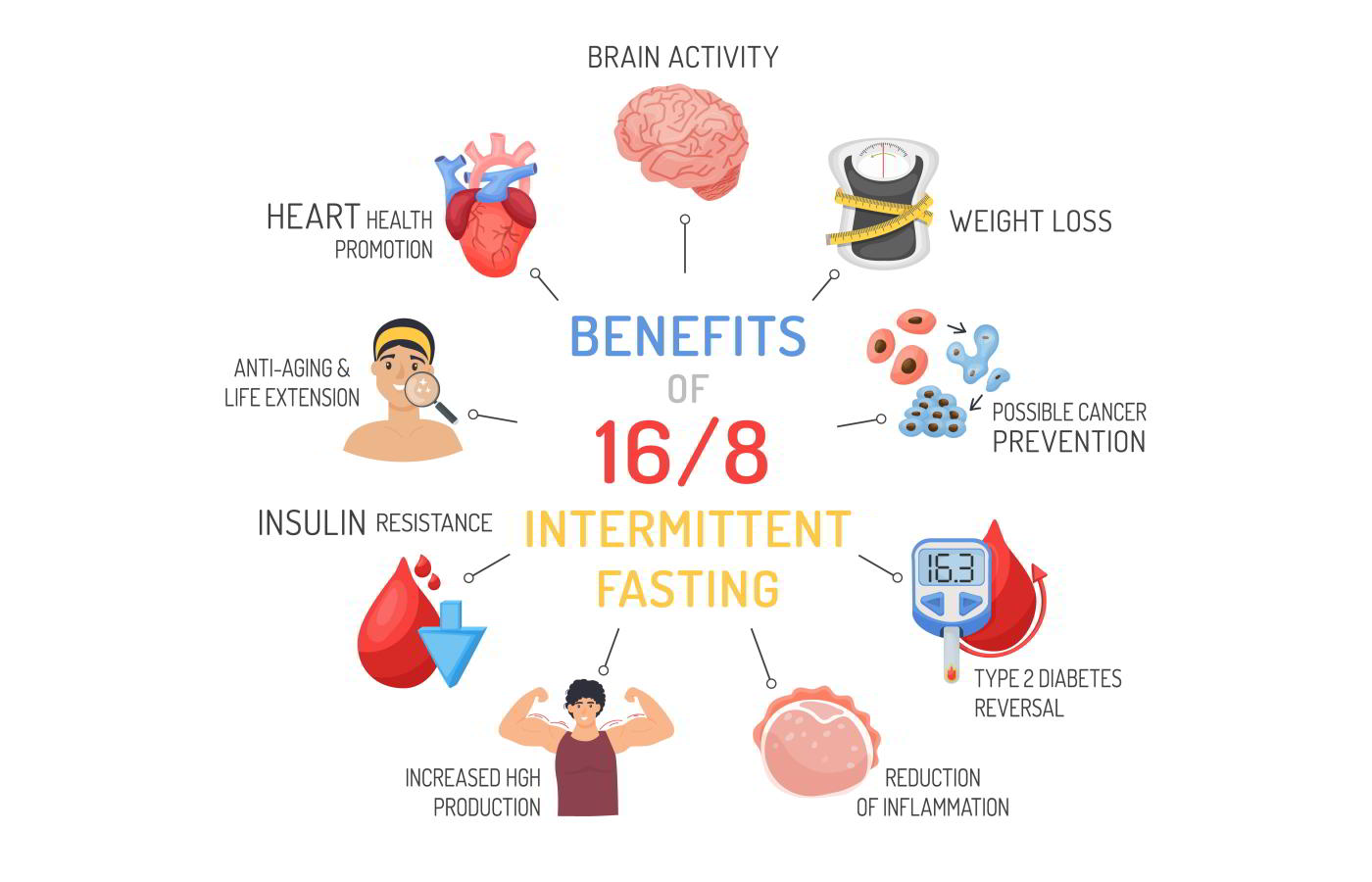Intermittent fasting is an dietary regimen in which people limit their food consumption to certain hours of the day. Some research suggests that it may have benefits beyond weight loss, like improved cognitive and cardiac health. It’s a widely discussed topic in the realm of health and fitness nowadays.
What is intermittent fasting?
Intermittent fasting involves periods of eating and fasting. It typically involves reducing your calorie intake to a certain number of hours per day, such as 16:8 fasting, where you would eat during an 8-hour window and fast for the remaining 16 hours. This can be used to promote weight loss, improve metabolic health, and provide other health benefits.
What effect does intermittent fasting have on blood pressure?
There are numerous reports from academics and healthcare professionals that examine the impact intermittent fasting has on blood pressure.
A review into intermittent fasting has been found to reduce blood pressure, oxidant damage, and the probability of atherosclerosis (clogged arteries). Additionally, it seems to have a beneficial effect on reducing heart risk factors such as obesity, hypertension, dyslipidemia and diabetes. Moreover, intermittent fasting has been linked to better results following a cardiac event.
A 2013 study found that one day of intermittent fasting has been shown to lead to a change in blood pressure, which is not associated with hypotension. In obese patients with hypertension on stable antihypertensive therapy, one-day intermittent fasting is accepted approvingly.
Another study that reviewed intermittent fasting and metabolic health demonstrated that it can assist in reducing hypertension and insulin resistance among those with type 2 diabetes. Additionally, it has been proven to be a successful approach for weight loss and its overall maintenance. Moreover, research has found that individuals who practise fasting often have a reduced risk of heart failure and a longer life span.
Who shouldn’t consider intermittent fasting?
Despite its many benefits, intermittent fasting is not advised for all individuals. Omitting meals and drastically lowering caloric intake can be dangerous for those with certain health conditions, such as diabetes. Prior to starting a fasting regimen, it is recommended that you discuss this with your doctor or general practitioner.
Intermittent fasting is not recommended if:
- You require a higher calorie intake – Individuals who are underweight, struggling with weight gain, under 18 years of age, pregnant or breastfeeding should not attempt an intermittent fasting diet.
- You have digestion issues – Eating large meals-which is often required for the types of IF that call for a long fast-can cause gastrointestinal stress. This is particularly concerning for people with irritable bowel syndrome or IBS, who already have a more sensitive gut.
- You have diabetes – Individuals with diabetes manage frequent fluctuations in their blood sugar levels on a daily basis, so fasting is not recommended as it may lead to further spikes and drops in glucose.
- You take medication that must be taken with food – Certain medications must be taken with a meal, as failing to do so can result in nausea, dizziness or light-headedness, among many other side effects.
- You have a weak immune system – Individuals who have recently experienced a major illness or are currently dealing with one should not begin intermittent fasting without first consulting a general practitioner or doctor.
How do I start intermittent fasting for better cardiovascular health?
Plan your meals
Organising meals is a significant part of intermittent fasting, as it assists in staying on course with your fasting routine. By planning your meals, you can ensure that you are getting the necessary nutrients and food groups throughout the day.
This can help keep your energy levels up during your fast and guarantee that you are obtaining adequate calories. Planning meals also aids in preventing overindulging when breaking the fast, which can aid in ward weight gain. Furthermore, planning meals can help adhere to a budget, since you will know precisely how much to buy each week.
Eat healthier foods
Eating healthier foods is a key part of intermittent fasting. Intermittent fasting requires that you eat quality, nutrient-rich food for optimal health, and it helps to avoid processed, sugary, and unhealthy foods.
Eating a diet that is rich in nutrient-dense foods such as vegetables, fruits, lean meats, seafood, and healthy fats can provide essential nutrients for energy and overall health. Additionally, eating healthy foods can also help to provide satiety for longer periods of time, which can help make intermittent fasting easier. Eating healthier foods can also help to reduce cravings and increase your overall energy levels.
Eat more minerals
Eating more minerals while fasting is a great way to ensure that you are getting the most out of your fasting period. Minerals are essential for a healthy body and can help to boost your energy levels, regulate your body temperature and keep your bones, teeth and muscles strong.
During fasting, they can help to keep you full and prevent cravings, as well as provide essential micronutrients. Eating more minerals can also help to reduce inflammation, improve digestion and boost your immune system. Eating a balanced diet with plenty of minerals is key for intermittent fasting, and it can make the experience much more enjoyable.
Lower your salt intake
Lowering salt intake is beneficial for fasting in a variety of ways. Salt can cause water retention, which can make you feel bloated while fasting. Additionally, it can make it difficult to stick to caloric restriction and subsequently, lead to water weight gain.
Reducing salt intake may help regulate the body’s water balance more efficiently and reduce the risk of dehydration, which can be especially important for those who are fasting for an extended period of time. Furthermore, reducing salt intake can help reduce high blood pressure, which can be beneficial for those who are fasting for health reasons. By lowering salt intake, intermittent fasters can experience greater success and comfort during their fasting periods.

What’s next?
Intermittent fasting has been shown to be an effective way of managing blood pressure. It has many benefits such as reducing weight and lowering blood pressure and cholesterol.
Fasting also helps to reduce inflammation, improve insulin sensitivity, and reduce stress hormones. By following an intermittent fasting plan, individuals can benefit from improved heart health and a reduction in their overall risk of cardiovascular disease. Get the latest on intermittent fasting and blood pressure management. Sign up for our newsletter and receive expert insights and tips today!
Monitoring your blood pressure daily while intermittent fasting is important to identify any trends and concerns as even though intermittent fasting may lower your blood pressure it should not be used in place of medical recommendations. At Aktiia we have developed a wearable blood pressure monitor that takes a number of readings of your blood pressure during the course of the day. If you want to learn more, look into our 24/7 blood pressure monitor or contact us today.
Disclaimer: This article is for educational purposes only and not medical advice. Consult your physician before making any changes to your diet or lifestyle. The author and publisher are not responsible for any adverse effects resulting from the use or application of the information presented in this article.
Sources:
Intermittent Fasting: A Heart Healthy Dietary Pattern? April 2020 – https://www.ncbi.nlm.nih.gov/articles-PMC7415631
Alternate day fasting for weight loss in normal weight and overweight subjects: a randomized controlled trial, Nov 2013 – https://nutritionj.biomedcentral.com/articles-10-1186-1475-2891-12-146
Intermittent Fasting and Metabolic Health, Jan 2022 – https://www.ncbi.nlm.nih.gov/articles-PMC8839325

